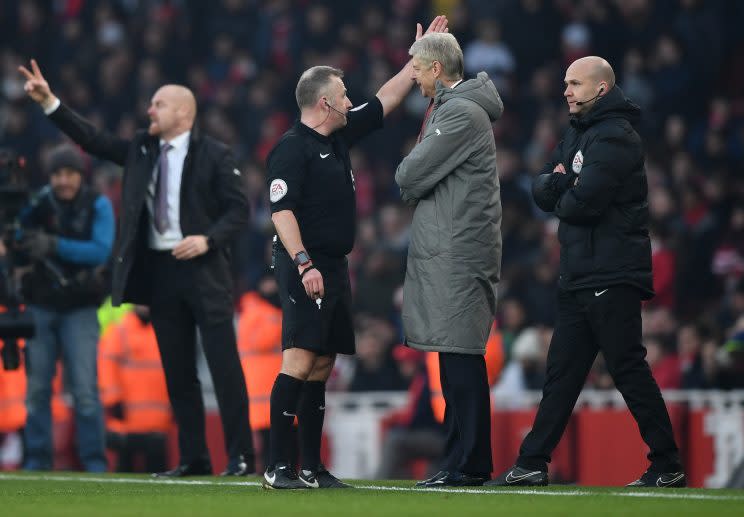Premier League Diary: How Wenger's touchline aggression cost him the Manchester United job

Alan Fictitious strode into the Manchester United boardroom. He came with purpose and conviction. The last thing he wanted was a manager who was going to destroy the reputation of the club. This was a club that was, to him, known for doing things the right way.
It was understood that United maintained good relationships with everyone at the FA when they could, and with their rivals across Europe and the Premier League. It was just common sense. When it came to disciplinary hearings, you don’t want those on the panels already set against you. When it came to asking for favours, it’s far better to do so not knowing you were definitely going to get a ‘no’ in response. Moving fixtures, appealing bans, or allowing players to miss international matches because of slight knocks – it could be the difference between winning the Premier League or finishing second.
Under Louis van Gaal, David Moyes, and even Alex Ferguson in the last few years, it was accepted that it just wasn’t worth the hassle to be combative with the FA. The season-long bans for Rio Ferdinand demonstrated how much damage could be done when the mood took them to do so. Fictitious wasn’t going to risk that.
Ed Woodward, too, didn’t want to let his brand be brought into disrepute. Woodward had risen to the top of United by exploiting the club’s reputation across the world. Divvying up the sponsorship opportunities into regions, rather than simple global deals, allowed him to turn United into the richest club in the world. He used the names of players like Angel Di Maria, Robin van Persie, Michael Carrick and – most importantly – Wayne Rooney to exploit the resources that clubs had to offer. Noodles, paint, Aeroflot – all of it could be hitched to a superstar, or Michael Carrick, and the money would come him every season.
The club might have fallen down the table, but the income didn’t betray that. As ticket sales, and even European prize money, faded into irrelevance compared to commercial activity and Premier League riches, Woodward’s skills were disproportionately effective, as long as the brand remained appealing. That’s why he was always keen to have a superstar figurehead, or figureheads if possible, to swing the deals. It couldn’t be put at risk if the club became known for reckless aggression and indiscipline. Everyone remembered the Dirty Leeds side, plenty secretly admired them, but nobody would buy a packet of crisps because of them.
Fictitious wasn’t especially bothered about the money side of things. Obviously, he knew it was important, and he’d always been keen to make the most of ticket sales, but to him the cultural significance of United being the most glamorous side in England, and the most respected across the world, was his first concern. He’d spent too long at the club to see this notion replaced by aggression and a lack of class.
So, when it came to planning for the future, they’d always kept tabs on what kind of manager could be considered were an urgent replacement needed. When Alex Ferguson left, he had the honourable David Moyes in mind. It might have failed for many obvious and less obvious reasons, but Moyes had always acted with decency, especially by the standards of modern football. In turn, Louis van Gaal brought a FA Cup and the Champions League, and despite the fact he was obviously toast in the final six months of his tenure, he kept his dignity. He was always open with the fans, and never too fractious with the opposition.
And Jose Mourinho had been aware of that. He’d risked it with some early sendings off when faced down with farcical decisions, which was embarrassing, but he’d negotiated the difficulties with an upturn in form, some last minute goals, and a commitment to attack. He’d won over Fictitious, slowly but not completely. Now the board was meeting to consider the future of United, should a new manager be needed in a season or two – no longer would they be caught on the hop.
And Fictitious stood up, and Fictitious spoke.
“There are many managers who we can’t consider because they don’t have the talent, but there’s just one whose attitude to the game would seriously damage our reputation and standing in the game.
“This is a man who has overseen a club that has had its captain spit straight into the face of opponents.
“This is a man whose team were defined by sly elbows into the face of anyone who dared to compete with them.
“This is a man who’d blithely proclaim ignorance about anything wrong that his club did, using a pathetic feigned indifference not just to insult the intelligence of the press, but his own fans, superiors, and of other clubs.
“This is a man who has gone into a major cup final with only one thought in his mind: to defend.
“This is a man who scooped up young talent from around the world, exploiting lax employment laws regarding children.
“This is a man who has taken to assaulting managers on the touchline with impunity, and now he’s started pushing and shoving officials to protest decisions. The man is a disgrace, and United must never traduce the good name of the club by replacing an honourable man like Jose Mourinho with a vile thug like Arsene Wenger.”


